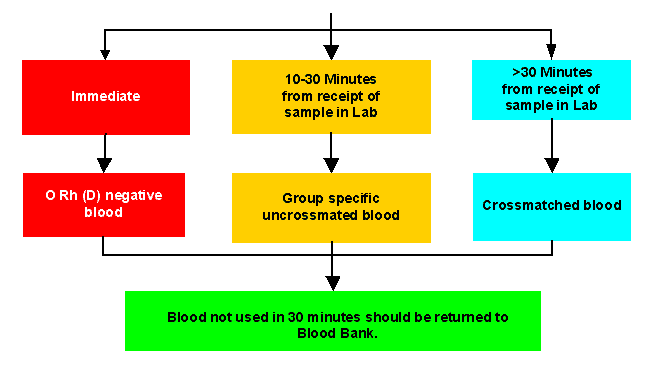Background
In some situations patients may require life-saving transfusion before the usual compatibility tests can be performed. The most frequently encountered clinical situations where emergency transfusion is required at The Royal Children's Hospital and The Royal Women's Hospital are massive obstetric haemorrhage, paediatric trauma, neonatal exsanguination and massive gastro-intestinal bleeding.
Blood Banks at both sites maintain an "Emergency Blood Kit" comprising 5 units of tagged O Rh(D) Negative, Kell Negative RBC units available for immediate release.
This information should be read in conjunction with the RCH Massive Transfusion and Critical Bleeding Procedure.

Types of blood available for emergency transfusion
- Universal donor (O neg) uncrossmatched red cells - when transfusion is required immediately and before testing can take place. A sample for subsequent testing must be collected prior to administration of blood.
- Group compatible uncrossmatched (type specific) red cells - when transfusion is required urgently before full testing can be completed. The laboratory issues red cells based on the blood group from a current sample (historical records should not be used).
- Emergency full crossmatch - preferred but takes longer.

Location of Emergency Blood at RCH and RWH
RCH Blood Bank Level 4
RWH Blood Bank Level 5
RWH Theatres Level 3
|
5 units O Rh(D) Negative RBC
5 units O Rh(D) Negative RBC
1 unit O Rh(D) Negative RBC
|

Emergency Contact
- RCH Phone 55829 or Page 5829
- RWH Phone 2553

Timeframes for Emergency Blood Release
- Phone or page Blood Bank - RCH phone 55829, page 5829 / RWH 2553 - include contact details. Information required by Blood Bank:
- Reason blood required
- Time required for blood
- Number of units required
- Authorising Doctor's name (responsible for resuscitation)
- Patient identification, if available (full name, UR No. & DOB)
- Destination and direct contact number
- Send staff member to collect blood
Collect pre-transfusion specimen (if not already in Blood Bank). Liaise with on-call Medical Haematologist (contact via switchboard RCH 91 / RWH 92)

NB. The times above are for the release of blood in emergency situations. Blood that is not required urgently may not be available within these times.
Reference, BB-P-025

Clinician Responsibilities
The clinician responsible for patient care must:
- Assess how urgently transfusion is required
- Request the appropriate blood support and communicate this to the blood bank
- Ensure a pre-transfusion sample is taken for subsequent testing
- Communicate with the haematologist regarding ongoing blood product support

Communication
Good communication is vital and facilitates appropriate blood product provision for your patient.
When the Emergency Blood Release Procedure is activated, the blood bank scientist is required to notify the haematologist on-call.
The haematologist will contact the clinical area to obtain further information regarding the clinical situation.
The purpose of this contact is to obtain clinical information to:
- Assist the scientist in prioritising laboratory workload.
- Obtain further blood stocks from ARCBS according to likely need.
- Predict likely need for Fresh Frozen Plasma, Cryoprecipitate and Platelet support and ensure products are available.
- Provide clinical advice regarding management of coagulopathy if requested.